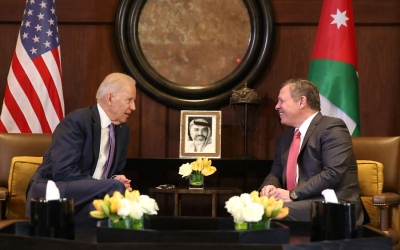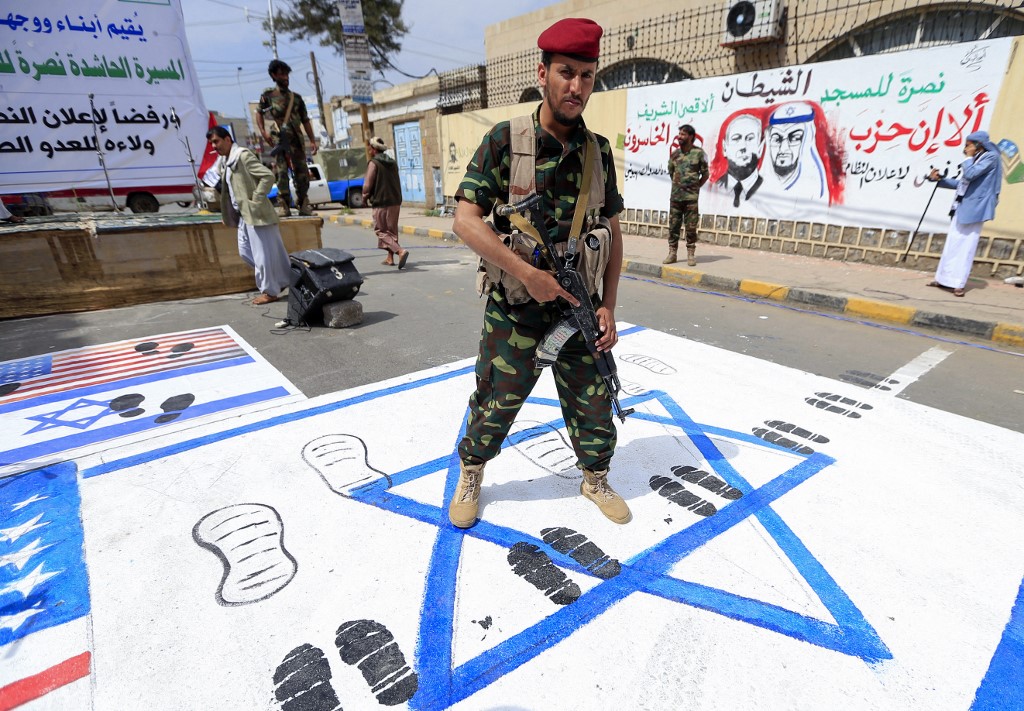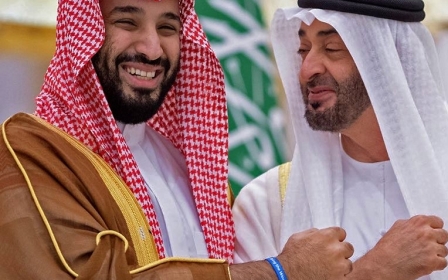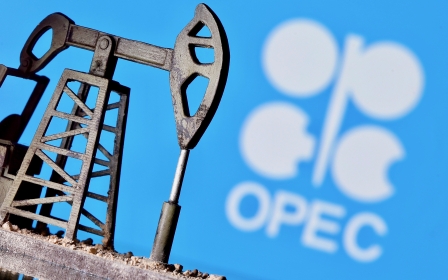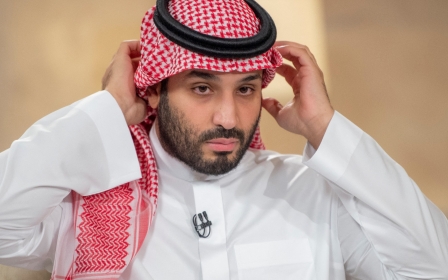MBS and MBZ fight for scraps after Trump and Netanyahu's exit
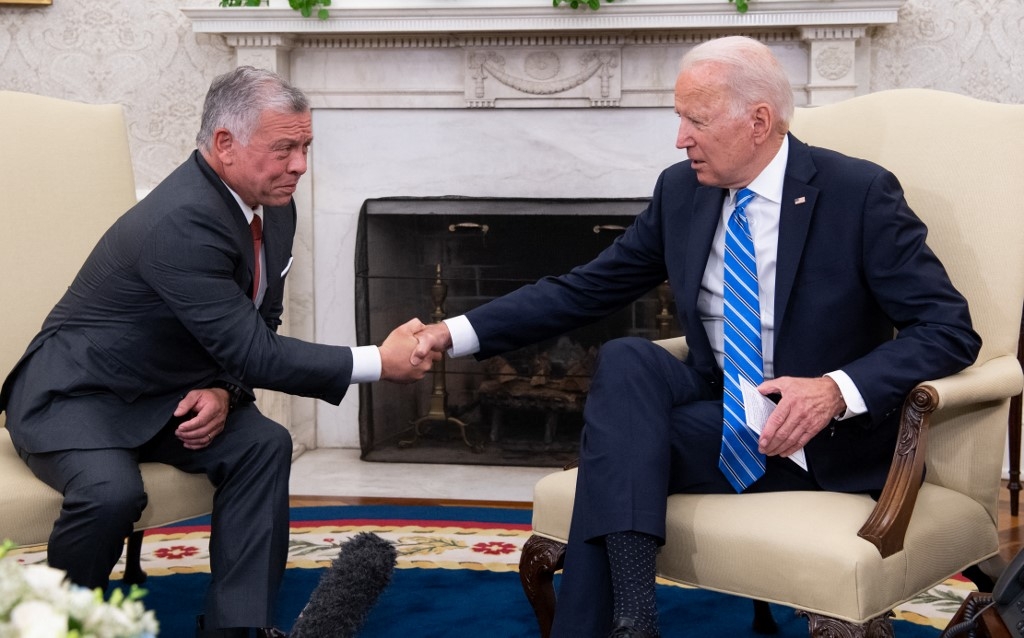
Imagine what would have happened if Donald Trump had secured a second term and Benjamin Netanyahu enough votes in the Knesset to form a government.
Iran would have been bombed by now - Netanyahu was pressing for an attack even when it was clear Trump had lost - Saudi would have normalised relations with Israel, and Jordan would be ruled by someone called King Hamza.
New MEE newsletter: Jerusalem Dispatch
Sign up to get the latest insights and analysis on Israel-Palestine, alongside Turkey Unpacked and other MEE newsletters
Instead talks with Iran are still on track, Saudi has gone cool on Israel, and King Abdullah of Jordan became the first Arab head of state to visit the White House.
Don’t get me wrong. There has been no change of heart. No light bulb has lit up in the head of an Arab despot. No one is remotely near thinking: “Why don’t I give transparency, elections and a free media a go?”
Nor has the arrival of Joe Biden, the candidate who promised a return to values, changed US foreign policy. It relies as much today as it did in previous administrations on a bedrock of regional Rottweilers.
The speed with which President Abdel Fattah el-Sisi of Egypt has turned from being Trump’s favourite dictator to Biden’s (after the war in Gaza) has been a wonder to behold.
Sisi is so confident of his utility to Biden that he had his intelligence chief, Abbas Kamel, embarrass the Americans by revealing that Washington had promised to imprison the Egyptian activist Mohammed Soltan on his release from Egyptian custody.
What’s changed, or stalled, is the grand plan.
The plan was to install Israel as the regional superpower, at the centre of a military and commercial web of fawning Sunni Arab despots
The plan was to install Israel as the regional superpower, at the centre of a military and commercial web of fawning Sunni Arab despots. Israel would supply them with the gear with which they could oppress their people, and they would put their money into Israel’s economy instead of their own. Palestinians and Jordanians would be reduced to Gastarbeiter, shuttle traders, in one giant Israeli-Saudi trading zone.
You kill two birds with one stone: Israel’s expanded diplomatic and military presence in the region covers the US withdrawal, and the Palestinian conflict is over. Neither Jared Kushner nor Israel’s former UN ambassador Danny Danon were exaggerating when they said, if these plans had gone ahead, the conflict was over.
There was just one cloud on the horizon of Kushner’s blue-sky thinking: no shred or element of consent from the Arab people themselves. Even by today’s standards when princes have replaced collective negotiation, which involves the institutions of state, the Abraham Accords was a deal over their heads.
It could never have got the popular vote in any of the countries that signed the dirty deal, let alone those who held back. It relied on the personal and financial relationships between four men, two of whom have now left the stage.
Thieves fall out
The other two, Crown Prince Mohammed bin Salman of Saudi Arabia and Crown Prince Mohammed bin Zayed of Abu Dhabi, have started to fight, as thieves are prone to do when the plan changes. They are the losers from the fallout of Trump and Netanyahu’s premature exit.
MBS increasingly resents being thought of as MBZ’s pupil, though the Saudi prince would not now be crown prince were it not for the Emirati’s planning and lobbying in Washington. And MBZ is increasingly pursuing his own agenda.
The Saudis are angered by evidence that the Emirates have developed their own 'back-door relations' with the Houthis, according to Gulf sources familiar with the issue
The spat over oil quotas, which was solved when the Saudi’s backed down, is only one of a growing list of issues that separate the two men. But even the oil quota row was hardly one kept behind closed doors. There was a full-throated pushback from a Saudi prince high up in the family, Abdulaziz bin Salman, the energy minister, before the emirates secured an increased quota.
MBZ’s visit to Riyadh on Monday papers over a number of cracks. First and foremost there is Yemen, where the Emiratis have secured their interests - the south and the ports - leaving the Saudis with an unfinished war with the Houthis.
The Saudis are angered by evidence that the Emirates have developed their own “back-door relations” with the Houthis, according to Gulf sources familiar with the issue.
As a free media does not exist in either country, the tweets of those commentators officially sanctioned to speak out are worthy of note.
Without mentioning Abu Dhabi by name, Abdullah al-Hatila, assistant editor of the Saudi newspaper Okaz, was clearly referring to it when he tweeted: “For those in whose hearts is the disease, the kingdom is the only country that has no ambitions in Yemen. The kingdom, the government and the people will not allow anyone to tamper with the security of Yemen to harm its security.”
Suleiman al-Aqili, the political analyst, did call out the Emiratis. “If Abu Dhabi does not help implement the Riyadh Agreement related to the crisis in southern Yemen and remains unchanged in disrupting it, I think that Saudi-Emirati relations will remain under test.”
Vision 2030 stalled
Second, there is the economy, stupid. Vision 2030 is not working. Under the original plan, Saudi Arabia should have attracted foreign capital to manufacture cars and weapons. As the Wall Street Journal reports, non-oil revenues should have quadrupled by 2020. In reality they have barely doubled. The oil sector still accounts for 80 percent of budget revenues and 88 percent of foreign income.
Foreign investment is not flowing into a modernised country. It’s trickling into a country with high unemployment rates, particularly among the youth. The biggest inflow of foreign capital was for a stake in Aramco’s pipeline business. It’s still oil, oil, and oil.
MBS keeps on finding out that his chief ally is his chief competitor, as in his decision to force multinationals to headquarter in Saudi or his refusal to reduce taxes on goods from the Emirati tax-free zone.
MBS has even grown cool on Israel, MBZ’s newest trading partner. Saudi Arabia has excluded goods made in free zones from Gulf Cooperation Council countries or using “Israeli input” from preferential taxes.
Silencing opposition voices
Turkey is also trimming, rather than changing, its path. Turkey appears to be responding to Cairo’s demands to shut down criticism from major opposition TV anchors based in Istanbul. The major opposition Egyptian TV anchors operating in Istanbul, such as Moataz Matar and Hisham Abdullah on Al Sharq TV, Mohamed Nasser and Hamza Zobaa of Mekameleen TV are all off air. Egyptian media criticism of Turkey has also been turned down.
Separately, Turkey and the UAE have reached similar understandings. Emirati opposition voices in Turkey have fallen silent, while Turkey sought the extradition from Dubai of Sedat Peker, the mob boss who broadcast on YouTube a slew of accusations of corruption against top Turkish government officials, including the interior minister, Suleyman Soylu.
The UAE refused, but four weeks ago Peker disappeared from view. Peker said that Emirati officials told him to stop appearing on videos because of the death threats against him. Whoever said what to whom, and the Turks will not confirm they asked for Peker’s removal, the job has been done.
The clearest sign of the regional shift taking place is the radically changed fortunes of King Abdullah of Jordan.
Three short months ago, the king was facing a full-blown palace coup involving his half brother Prince Hamza. A four-strong Saudi delegation headed by Saudi Foreign Minister Faisal bin Farhan was in Amman demanding the return of Bassem Awadallah, a former Jordanian royal court chief and former special adviser to MBS, and Sharif Abdel Rahman Hassan bin Zaid - both charged with incitement against the king.
The kingdom itself was roiled with unrest at the country’s response to Covid, oxygen shortages, and the economy. The tribes were once more restive.
On Monday, King Abdullah, Queen Rania and Crown Prince Hussein bin Abdullah were strolling through the White House, the first Arab ruling family to be welcomed to Washington by Biden. Biden called the king “a good, loyal, decent friend”. US troops are being deployed from Qatar and Iraq to Jordan.
The Israelis meanwhile have stopped starving the kingdom of water and a meeting between the king and the new prime minister, Naftali Bennett, has been set up. The Israelis have suddenly rediscovered the benefit of a stable Jordan and have dramatically stopped joint attempts with Riyadh to destabilise it. Awadallah and bin Zaid got 15 years hard labour.
What a turnaround in three months.
Recalibration
While kings, queens and knights arrange themselves on the chessboard in a new configuration, life has not changed for the pawns themselves.
From the Gulf to the Mediterranean, these states are weaker than they have ever been. There are more people in poverty, more unemployed.
Few Jordanians are better off as a result of Biden saving Abdullah’s skin. The World Bank calculated that the Jordanian economy contracted by 1.6 percent last year, with unemployment rising to 24.7 percent. Youth unemployment has reached a staggering 50 percent. Even in rich Saudi, unemployment is running at 12 percent, and the unofficial figure must be higher.
There is total political stalemate. Lebanon is joining the growing list of failed states, and there is no possibility of rebuilding Syria or Yemen or Libya in the immediate future. Dead battlefields remain barren lands.
It is only when the Arab people rise and secure governments that are accountable to them and rebuild their shattered economies that change will happen. What we are seeing is a recalibration of regional alliances.
The real change has still to come. When it does, it will sweep all these plotters and their machinations away, as surely as the fires and floods which are wreaking havoc in California , western Germany and China.
This article is available in French on Middle East Eye French edition.
Middle East Eye delivers independent and unrivalled coverage and analysis of the Middle East, North Africa and beyond. To learn more about republishing this content and the associated fees, please fill out this form. More about MEE can be found here.



